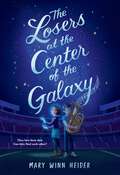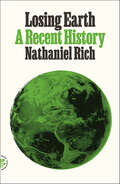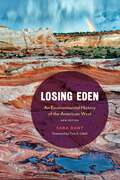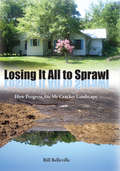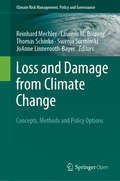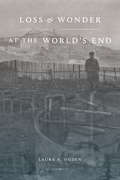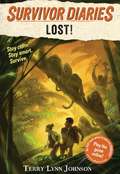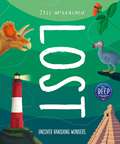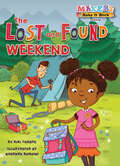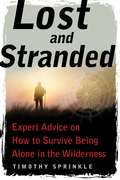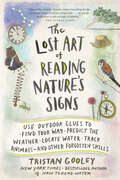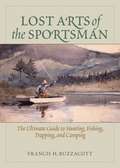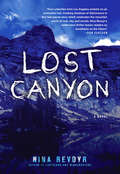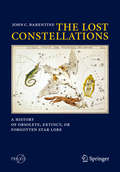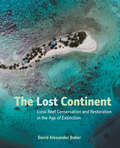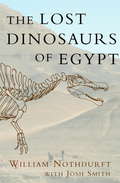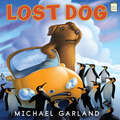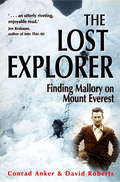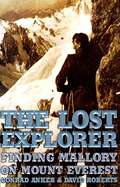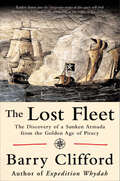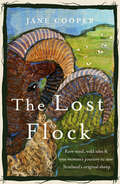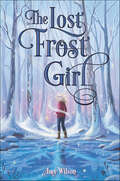- Table View
- List View
The Losers at the Center of the Galaxy
by Mary Winn HeiderA tuba player without a tuba and his jellyfish-imitating sister cope with their father's disappearance in this hilarious and moving novel by the author of The Mortification of Fovea Munson. When Lenny Volpe, former quarterback of the worst professional football team in the nation, leaves his family and disappears, the Chicago Horribles win their first game in a long time. Fans are thrilled. The world seems to go back to normal. Except for the Volpe kids.Winston throws himself into playing the tuba, and Louise starts secret experiments to find a cure for brain injuries, and they're each fine, just fine, coping in their own way. That is, until the investigation of some eccentric teacher behavior and the discovery of a real live bear paraded as the Horribles' new mascot make it clear that things are very much Not Fine. The siblings may just need each other, after all.
Losing Earth: A Recent History
by Nathaniel RichBy 1979, we knew nearly everything we understand today about climate change—including how to stop it. Over the next decade, a handful of scientists, politicians, and strategists, led by two unlikely heroes, risked their careers in a desperate, escalating campaign to convince the world to act before it was too late. Losing Earth is their story, and ours.The New York Times Magazine devoted an entire issue to Nathaniel Rich’s groundbreaking chronicle of that decade, which became an instant journalistic phenomenon—the subject of news coverage, editorials, and conversations all over the world. In its emphasis on the lives of the people who grappled with the great existential threat of our age, it made vivid the moral dimensions of our shared plight.Now expanded into book form, Losing Earth tells the human story of climate change in even richer, more intimate terms. It reveals, in previously unreported detail, the birth of climate denialism and the genesis of the fossil fuel industry’s coordinated effort to thwart climate policy through misinformation propaganda and political influence. The book carries the story into the present day, wrestling with the long shadow of our past failures and asking crucial questions about how we make sense of our past, our future, and ourselves. Like John Hersey’s Hiroshima and Jonathan Schell’s The Fate of the Earth, Losing Earth is the rarest of achievements: a riveting work of dramatic history that articulates a moral framework for understanding how we got here, and how we must go forward.
Losing Eden: An Environmental History of the American West (Environment and Region in the American West)
by Sara DantHistorical narratives often concentrate on wars and politics while omitting the central role and influence of the physical stage on which history is carried out. In Losing Eden award-winning historian Sara Dant debunks the myth of the American West as &“Eden&” and instead embraces a more realistic and complex understanding of a region that has been inhabited and altered by people for tens of thousands of years. In this lively narrative Dant discusses the key events and topics in the environmental history of the American West, from the Beringia migration, Columbian Exchange, and federal territorial acquisition to post–World War II expansion, resource exploitation, and current climate change issues. Losing Eden is structured around three important themes: balancing economic success and ecological destruction, creating and protecting public lands, and achieving sustainability. This revised and updated edition incorporates the latest science and thinking. It also features a new chapter on climate change in the American West, a larger reflection on the region&’s multicultural history, updated current events, expanded and diversified suggested readings, along with new maps and illustrations. Cohesive and compelling, Losing Eden recognizes the central role of the natural world in the history of the American West and provides important analysis on the continually evolving relationship between the land and its inhabitants.
Losing It All to Sprawl: How Progress Ate My Cracker Landscape (Florida History and Culture)
by Bill BellevilleLosing It All to Sprawl is the poignant chronicle of award-winning nature writer Bill Belleville and how he came to understand and love his historic Cracker farmhouse and "relic" neighborhood in central Florida, even as it was all wiped out from under him. Belleville's narrative is eloquent, informed, and impassioned, a saga in which tractors and backhoes trample through the woods next to his home in order to build the backbone of Florida sprawl--the mall. As heavy machinery encircles Belleville and his community--the noise growing louder and closer, displacing everything Belleville has called home for the past fifteen years--he tells a story that is much older, 10,000 years older. The story stretches back to the Timucua and the Mayaca living in harmony with Florida's environment; the conquistadors who expected much from, but also feared, this "land of flowers"; the turn-of-the-century tourists "modernizing" and "climatizing" the state; the original Cracker families who lived in Belleville's farmhouse. In stark contrast to this millennia-long transformation is the whiplash of unbridled growth and development that threatens the nearby wilderness of the Wekiva River system, consuming Belleville's home and, ultimately, his very sense of place.In Florida, one of the nation's fastest growing states (and where local and state governments encourage growth), balancing use with preservation is an uphill battle. Sprawl spreads into the countryside, consuming not just natural lands but Old Florida neighborhoods and their unique history. In Losing It All to Sprawl, Belleville accounts for the impacts--social, political, natural, personal--that a community in the crosshairs of unsustainable growth ultimately must bear, but he also offers Floridians, and anyone facing the blight of urban confusion, the hope that can be found in the rediscovery and appreciation of the natural landscape.
Loss and Damage from Climate Change: Concepts, Methods and Policy Options (Climate Risk Management, Policy and Governance)
by Reinhard Mechler Laurens M. Bouwer Thomas Schinko Swenja Surminski JoAnne Linnerooth-BayerThis book provides an authoritative insight on the Loss and Damage discourse by highlighting state-of-the-art research and policy linked to this discourse and articulating its multiple concepts, principles and methods. Written by leading researchers and practitioners, it identifies practical and evidence-based policy options to inform the discourse and climate negotiations.With climate-related risks on the rise and impacts being felt around the globe has come the recognition that climate mitigation and adaptation may not be enough to manage the effects from anthropogenic climate change. This recognition led to the creation of the Warsaw International Mechanism on Loss and Damage in 2013, a climate policy mechanism dedicated to dealing with climate-related effects in highly vulnerable countries that face severe constraints and limits to adaptation. Endorsed in 2015 by the Paris Agreement and effectively considered a third pillar of international climate policy, debate and research on Loss and Damage continues to gain enormous traction. Yet, concepts, methods and tools as well as directions for policy and implementation have remained contested and vague.Suitable for researchers, policy-advisors, practitioners and the interested public, the book furthermore:• discusses the political, legal, economic and institutional dimensions of the issue• highlights normative questions central to the discourse• provides a focus on climate risks and climate risk management.• presents salient case studies from around the world.
Loss and Wonder at the World’s End
by Laura A. OgdenIn Loss and Wonder at the World's End, Laura A. Ogden brings together animals, people, and things—from beavers, stolen photographs, lichen, American explorers, and birdsong—to catalog the ways environmental change and colonial history are entangled in the Fuegian Archipelago of southernmost Chile and Argentina. Repeated algal blooms have closed fisheries in the archipelago. Glaciers are in retreat. Extractive industries such as commercial forestry, natural gas production, and salmon farming along with the introduction of nonnative species are rapidly transforming assemblages of life. Ogden archives forms of loss—including territory, language, sovereignty, and life itself—as well as forms of wonder, or moments when life continues to flourish even in the ruins of these devastations. Her account draws on long-term ethnographic research with settler and Indigenous communities; archival photographs; explorer journals; and experiments in natural history and performance studies. Loss and Wonder at the World's End frames environmental change as imperialism's shadow, a darkness cast over the earth in the wake of other losses.
Lost! (Survivor Diaries)
by Terry Lynn Johnson Jani OrbanA high-stakes survival series perfect for fans of the I Survived series and Hatchet. Stay calm. Stay smart. Survive. An ancient myth about a statue leads eleven-year-old Carter and twelve-year-old Anna down a trail deep into the Costa Rican jungle. They get turned around, then chased by howler monkeys. Carter and Anna try to find their way back to the familiar path, but the tangle of vines and trees all look the same. They are . . . lost! With seventeen years of hands-on experience and training in remote areas, survival expert Terry Lynn Johnson(Ice Dogs; Sled Dog School) creates on-the-edge-of-your-seat storytelling featuring real skills to prepare kids for surviving a disaster. This book includes tips from the Canadian Red Cross on how to make your own survival kit. After reading this book, you'll be better prepared for surviving a real-life disaster.
Lost: Discover disappearing wonders
by Jess McGeachinA book that explores what it means to be lost, in all sorts of ways. The story of our world is one of constant change. At times it's been slow, as animals evolved and continents drifted apart. But it's also been rapid - like the giant asteroid that ended the reign of the dinosaurs. Lost asks readers what it means to be here and gone on our tiny planet. They'll find lost cities like Machu Picchu and Pompeii, meet amazing megafauna that once roamed the earth and learn about contemporary species under threat. They'll discover that sometimes being lost the safest place to be - just ask the cleverly camouflaged animals hiding in plain sight.
Lost and Found
by Jacqueline SheehanAfter the sudden, unexpected death of her husband, Rocky moves to Peak's Island, Maine, and takes a job as an Animal Control Warden. She becomes involved with a wounded black Lab and several interesting neighbors and residents, solves a mystery, and finds romance and happiness. As an Animal Warden, Rocky experiences much of what real-life animal care and control professionals go through, from rescuing lost and injured pets and wildlife, to the heartbreak of finding pets abandoned by vacationers at the end of their stay, to resolving common conflicts with wildlife.
The Lost and Found Weekend (Makers Make It Work)
by Kiki ThorpeTying into the popular Makers Movement, Makers Make it Work is a series of fun easy-to-read stories that focus on problem-solving and hands-on action. With bright, eye-catching art and explanatory sidebars with additional information on the topic, these books show kids how to use their hands, their heads, their creativity, and their problem-solving skills to overcome every challenge facing them. Gia's dad is always losing things. His glasses. His phone. It almost ruins their camping trip. Gia needs to figure out a way to fix her dad! With the Makers Make It Work series, any kid can be a Maker! Each book also includes an activity for young makers to try themselves. (Topic: Sewing)
Lost and Stranded: Expert Advice on How to Survive Being Alone in the Wilderness
by Timothy SprinkleFor anyone who spends time in the backcountry, understanding not only what sorts of dangers you can run into out there but also exactly what those risks can do to you is part of being a smart, well informed outdoor traveler. In Lost and Stranded, author Timothy Sprinkle breaks down the perils that can befall hikers, hunters, and other outdoor enthusiasts. There are animal encounters, weather events (lightning strikes), parasites (giardia), biting insects (bees/wasps), winter hazards (avalanches), natural disasters (forest fires), hypothermia, dehydration, disorientation, and much, much more to worry about. Although these risks are generally well known, what’s less understood by many adventurers is what exactly happens to you when, say, you become malnourished in the backcountry. What does it feel like? How does the condition progress? How long do you generally have before the body shuts down? What helps or hurts when you’re fighting for survival? Lost and Stranded will answer these questions and many more by taking an inside look at more than two dozen outdoor hazards. Each one will include a narrative section that dramatizes the experience of a certain situation based on real-world events. From there, information from expert sources—medical doctors, first responders, wildlife experts, and others—will fill in the details around exactly how each scenario plays out on the ground, followed by suggestions on how to avoid or survive each risk factor, making this book is a vital resource for outdoor travelers.
The Lost Art of Reading Nature's Signs: Use Outdoor Clues To Find Your Way, Predict The Weather, Locate Water, Track Animals--and Other Forgotten Skills (Natural Navigation #0)
by Tristan GooleyTurn every walk into a game of detection—from master outdoorsman Tristan Gooley, New York Times-bestselling author of How to Read a Tree and The Natural Navigator When writer and navigator Tristan Gooley journeys outside, he sees a natural world filled with clues. The roots of a tree indicate the sun’s direction; the Big Dipper tells the time; a passing butterfly hints at the weather; a sand dune reveals prevailing wind; the scent of cinnamon suggests altitude; a budding flower points south. To help you understand nature as he does, Gooley shares more than 850 tips for forecasting, tracking, and more, gathered from decades spent walking the landscape around his home and around the world. Whether you’re walking in the country or city, along a coastline, or by night, this is the ultimate resource on what the land, sun, moon, stars, plants, animals, and clouds can reveal—if you only know how to look! Publisher’s Note: The Lost Art of Reading Nature’s Signs was previously published in the UK under the title The Walker’s Guide to Outdoor Clues and Signs.
Lost Arts of the Sportsman: The Ultimate Guide to Hunting, Fishing, Trapping, and Camping
by Francis Henry BuzzacottThe Lost Art of the Sportsman is an exhaustive reference text and a compulsively addictive narrative from the turn of the 1900s.Francis H. Buzzacott would find little in common with the hiker and camper of contemporary times. This is the American frontiersman at his best—no-holds-barred approach to sporting. And while some of the advice and information in The Lost Art of the Sportsman has undoubtedly been replaced with the advent of new technology, what’s surprising is just how much of the book is still essential advice and knowledge for the modern hunter, fisher, and camper.Inside, you’ll learn: What to bring on a fishing, hunting, or camping trip Recipes for easy campfire meals Hunting, fishing, and trapping tips for a variety of animals How to deal with an emergency in a remote place Clothing choices for a variety of situations Tips and secrets for all varieties of firearmsFaithfully reproduced exactly how it was originally printed, The Lost Art of the Sportsman comes complete with hundreds of original pieces of line drawings and artwork, a true collector’s edition for hunters, fisherman, and campers alike.
The Lost Campers (Sugar Creek Gang #4)
by Paul HutchensThe Sugar Creek Gang heads to Minnesota for a camping trip. There they discover a railroad coach in the middle of a forest without any railroad tracks, and an honest-to-goodness Indian with beads and a war bonnet. What are they to make of this?
Lost Canyon
by Nina RevoyrOne of the San Francisco Chronicle's 100 Recommended Books of 2015"Los Angeles is home to many great storytellers, but Nina Revoyr is one of its finest scribes....[Lost Canyon] pulses with both beauty and terror, and the struggles of these characters, their physical and mental reckonings, are enough to make readers sweat without getting off the couch."--Los Angeles Times"Revoyr [is] an edgy and spellbinding writer with an uncanny gift for aligning human struggles with nature's glory and perils....With ravishing descriptions of the magnificent landscape, unrelenting suspense, incisive psychology, and shrewd perspectives on matters of race and gender, Revoyr has created a gripping tale of unintended adventure and profound transformation."--Booklist, Starred review"A suspenseful adventure story that explores how people react to danger, uncertainty, fear, and life-or-death choices....This is an exciting, page-turning adventure story that reveals how good people can do things totally contrary to their own moral code, and the conclusion will both surprise and satisfy."--Publishers Weekly"Revoyr travels LA's patchwork neighborhoods--delineating gangs and money, color and prejudice--and nicely sketches 'the grand, untamed Sierra.' Like Deliverance, a tense...morality tale formed in the crucible of physical duress."--Kirkus Reviews"With a nod to James Dickey's Deliverance...A direct, bangin' read for those interested in how people deal with physical and moral challenges."--Library Journal"An exciting blend of literary fiction and thrilling suspense--a harrowing trip into physical danger and a clever meditation on race relations and bravery."--Shelf AwarenessA Book Riot Quick Pick/Book of the Week for the week of August 28, 2015"What a pleasure it is seeing characters that live and breathe in the same textured universe that we do....Linked to complicated national issues, imbued with layered representations of Angelenos, [Revoyr] has brought us an intellectually adroit, emotionally nerve-wracking, page-turning thriller."--Los Angeles Review of Books"Even at its deadliest, Revoyr makes the high altitude seem mesmerizing....Revoyr has created characters we care for, issues we need to think about, and vistas that linger, making reading her book almost as much of a rush as scaling the sheer, icy rock of the Sierra Nevada."--San Francisco ChronicleFour people on a backpacking trip in the Sierra Nevada find more adventure than they ever imagined. Each of them is drawn to the mountains for reasons as diverse as their own lives. Gwen Foster, a counselor for at-risk youth, is struggling with burnout from the demands of her job and with the loss of one of her teens. Real estate agent Oscar Barajas is adjusting to the fall of the housing market and being a single parent. Todd Harris, an attorney, is stuck in a lucrative but unfulfilling career--and in a failing marriage. They are all brought together by their trainer, Tracy Cole, a former athlete with a taste for risky pursuits.When the hikers start up a pristine mountain trail that hasn't been traveled in years, all they have to guide them is a hand-drawn map of a remote, mysterious place called Lost Canyon. At first, the route past high alpine lakes and under towering, snowcapped peaks offers all the freedom and exhilaration they'd hoped for. But when they stumble onto someone who doesn't want to be found, the group finds itself faced with a series of dangerous conflicts, moral dilemmas, confrontations with nature, and an all-out struggle for survival.Moving effortlessly between city and wilderness, Lost Canyon explores the ways that race, class, and culture shape experience and perception. It examines the choices good people must face in desperate situations. Set in the grand, wild landscape of the California mountains, Lost Canyon is a story of brewing social tensions and breathtaking adventure that will keep readers on the edge of their seats.
The Lost Constellations
by John C. BarentineCasual stargazers are familiar with many classical figures and asterisms composed of bright stars (e. g. , Orion and the Plough), but this book reveals not just the constellations of today but those of yesteryear. The history of the human identification of constellations among the stars is explored through the stories of some influential celestial cartographers whose works determined whether new inventions survived. The history of how the modern set of 88 constellations was defined by the professional astronomy community is recounted, explaining how the constellations described in the book became permanently "extinct. " Dr. Barentine addresses why some figures were tried and discarded, and also directs observers to how those figures can still be picked out on a clear night if one knows where to look. These lost constellations are described in great detail using historical references, enabling observers to rediscover them on their own surveys of the sky. Treatment of the obsolete constellations as extant features of the night sky adds a new dimension to stargazing that merges history with the accessibility and immediacy of the night sky.
The Lost Continent: Coral Reef Conservation and Restoration in the Age of Extinction
by David Alexander BakerThis poignant tribute to the beauty of coral reefs sheds light on the destruction of global reef ecosystems and the climate science behind the conservation efforts to save them.Broken into three parts—Discovering Corals, Wonder and Devastation, and Searching for Hope—and told through a series of gripping stories, author and documentarian David Alexander Baker takes readers on a global adventure to the front lines of an unfolding ecological crisis. More than half of the world's coral reefs have been destroyed in the past fifty years due to the climate crisis. The Lost Continent helps readers gain a deeper understanding of coral reefs and why they are vital to the health of our oceans—and the survival of our planet—and highlights the incredible conservation and restoration strides being made around the world. With over 60 breathtaking photographs of coral reefs spanning from Colombia to Australia to the Florida Keys readers will be moved both by the majesty of nature and the urgency to preserve and restore these great cities of the seas.
The Lost Dinosaurs of Egypt
by William Nothdurft Josh Smith Matt Lamanna Ken Lacovara Jason Poole Jen SmithGerman paleontologist Ernst Frieherr Stromer von Reichenbach first sighted them in 1911, identified four new species, collected fossils, and deposited them in a Munich museum where they were destroyed by bombing during World War II. US graduate student Josh Smith (now paleontology, Washington U. ) led a team back to Egypt in 2000 to continue the work. Science writer tells the story in a companion to a television documentary. Annotation c. Book News, Inc. , Portland, OR (booknews. com)
Lost Dog (I Like to Read)
by Michael GarlandWhen Pete sets off for Grandma's house, he runs into bad traffic. He tries a different route, and soon finds himself lost on a woodsy road. "Where is Mutt Street?" he asks a bear. "That way," the bear replies. As Pete follows directions from different animals he meets, he finds himself in the desert, the jungle and even the arctic! In this story of an accidental journey turned epic adventure, early readers will delight in all of Pete's stops along the way to Mutt Street, where Grandma is there to greet him. An I Like to Read® book for emerging readers. Guided Reading Level C.
The Lost Explorer: Finding Mallory on Mount Everest
by Conrad Anker David RobertsIn 1999, Conrad Anker found the body of George Mallory on Mount Everest, casting an entirely new light on the mystery of the lost explorer.On 8 June 1924, George Leigh Mallory and Andrew 'Sandy' Irvine were last seen climbing towards the summit of Everest. The clouds closed around them and they were lost to history, leaving the world to wonder whether or not they actually reached the summit - some 29 years before Edmund Hillary and Tensing Norgay.On 1 May 1999, Conrad Anker, one of the world's foremost mountaineers, made the momentous discovery - Mallory's body, lying frozen into the scree at 27,000 feet on Everest's north face. Recounting this day, the authors go on to assess the clues provided by the body, its position, and the possibility that Mallory had successfully climbed the Second Step, a 90-foot sheer cliff that is the single hardest obstacle on the north face. A remarkable story of a charming and immensely able man, told by an equally talented modern climber.
The Lost Explorer: Finding Mallory on Mount Everest
by David Roberts Conrad AnkerIn 1999, Conrad Anker found the body of George Mallory on Mount Everest, casting an entirely new light on the mystery of the lost explorer.On 8 June 1924, George Leigh Mallory and Andrew 'Sandy' Irvine were last seen climbing towards the summit of Everest. The clouds closed around them and they were lost to history, leaving the world to wonder whether or not they actually reached the summit - some 29 years before Edmund Hillary and Tensing Norgay.On 1 May 1999, Conrad Anker, one of the world's foremost mountaineers, made the momentous discovery - Mallory's body, lying frozen into the scree at 27,000 feet on Everest's north face. Recounting this day, the authors go on to assess the clues provided by the body, its position, and the possibility that Mallory had successfully climbed the Second Step, a 90-foot sheer cliff that is the single hardest obstacle on the north face. A remarkable story of a charming and immensely able man, told by an equally talented modern climber.
The Lost Explorer
by David Roberts Conrad AnkerThis is the adventure story of the year -- how Conrad Anker found the body of George Mallory on Mount Everest, casting an entirely new light on the mystery of the explorer who may have conquered Everest seventy-five years ago. On June 8, 1924, George Leigh Mallory and Andrew "Sandy" Irvine were last seen climbing toward the summit of Mount Everest. Clouds soon closed around them, and they vanished into history. Ever since, mountaineers have wondered whether they reached the summit twenty-nine years before Edmund Hillary and Tenzing Norgay. On May 1, 1999, Conrad Anker, one of the world's strongest mountaineers, discovered Mallory's body lying facedown, frozen into the scree and naturally mummified at 27,000 feet on Everest's north face. The condition of the body, as well as the artifacts found with Mallory, including goggles, an altimeter, and a carefully wrapped bundle of personal letters, are important clues in determining his fate. Seventeen days later, Anker free-climbed the Second Step, a 90-foot sheer cliff that is the single hardest obstacle on the north ridge. The first expedition known to have conquered the Second Step, a Chinese team in 1975, had tied a ladder to the cliff, leaving unanswered the question of whether Mallory could have climbed it in 1924. Anker's climb was the first test since Mallory's of the cliff's true difficulty. In treacherous conditions, Anker led teammate Dave Hahn from the Second Step to the summit. Reflecting on the climb, Anker explains why he thinks Mallory and Irvine failed to make the summit, but at the same time, he expresses his awe at Mallory's achievement with the primitive equipment of the time. Stunningly handsome and charismatic, Mallory charmed everyone who met him during his lifetime and continues to fascinate mountaineers today. He was an able writer, a favorite of the Bloomsbury circle, and a climber of legendary gracefulness. The Lost Exploreris the remarkable story of this extraordinarily talented man and of the equally talented modern climber who spearheaded a discovery that may ultimately help solve the mystery of Mallory's disappearance.
The Lost Fleet: The Discovery of a Sunken Armada from the Golden Age of Piracy
by Barry Clifford Kenneth KinkorOn January 2, 1678, a fleet of French ships sank off the Venezuelan coast. This proved disastrous for French naval power in the region, and sparked the rise of a golden age of piracy.Tracing the lives of fabled pirates like the Chevalier de Grammont, Nikolaas Van Hoorn, Thomas Paine, and Jean Comte d'Estrées, The Lost Fleet portrays a dark age, when the outcasts of European society formed a democracy of buccaneers, settling on a string of islands off the African coast. From there, the pirates haunted the world's oceans, wreaking havoc on the settlements along the Spanish mainland and -- often enlisted by French and English governments -- sacking ships, ports, and coastal towns.More than three hundred years later, writer, explorer, and deep-sea diver Barry Clifford follows the pirates' destructive wake back to Venezuela. With the help of a lost map, drawn by the captain of the lost French fleet, Clifford locates the site of the disaster and wreckage of the once-mighty armada.
The Lost Flock: Rare Wool, Wild Isles and One Woman’s Journey to Save Scotland’s Original Sheep
by Jane CooperThe Lost Flock is the story of the remarkable and rare little horned sheep, known as Orkney Boreray, and the wool-obsessed woman who moved to one of Scotland’s wildest islands to save them. It was Jane Cooper’s passion for knitting that led her to discover the world of rare-breed sheep and their wool. Through this, Jane uncovered the ‘Orkney Borerary’ – a unique group within the UK’s rarest breed of sheep, the Boreray, and one of the few surviving examples of primitive sheep in northern Europe. As her knowledge of this rarest of heritage breeds grew, she took the bold step to uproot her quiet suburban life in Newcastle and relocate to Orkney, embarking on a new adventure and life as farmer and shepherd. Jane was astonished to find that she was the sole custodian of this lost flock in the world, and so she began investigating their mysterious and ancient history, tracking down the origins of the Boreray breed and its significance to Scotland’s natural heritage. From Viking times to Highland crofts and nefarious research experiments in Edinburgh, this is a so-far untold real-life detective story. It is also the story of one woman’s relentless determination to ensure a future for her beloved sheep, and in doing so revealing their deep connection to the Scottish landscape. An unforgettable story of a heritage breed and the importance of its existence.
The Lost Frost Girl
by Amy WilsonA modern-day fairy tale full of frosty magic, Amy Wilson’s stunning debut about a girl who discovers that she is Jack Frost’s daughter will enchant fans of the Emily Windsnap series and Frozen.“As magical as frost itself, The Lost Frost Girl is a truly special tale, told with gorgeous prose and filled with compelling characters. I absolutely loved it!” —Sarah Beth Durst, author of Journey Across the Hidden IslandsWith a name like hers, Owl never expected her life to be normal, at home or at school. But when Owl finds out that she is Jack Frost’s daughter, her world shifts beyond what she could ever imagine.Determined to meet him, Owl delves into Jack’s wonderful world of winter and magic—the kind of place she thought only existed in fairy tales. And as she notices frost patterns appearing on her skin and her tears turning to ice, Owl starts to wonder if being Jack Frost’s daughter means that she has powers of her very own.At once breathtaking and brimming with heart, The Lost Frost Girl is a story of family, friendship, and the magic of embracing who you are meant to be.
